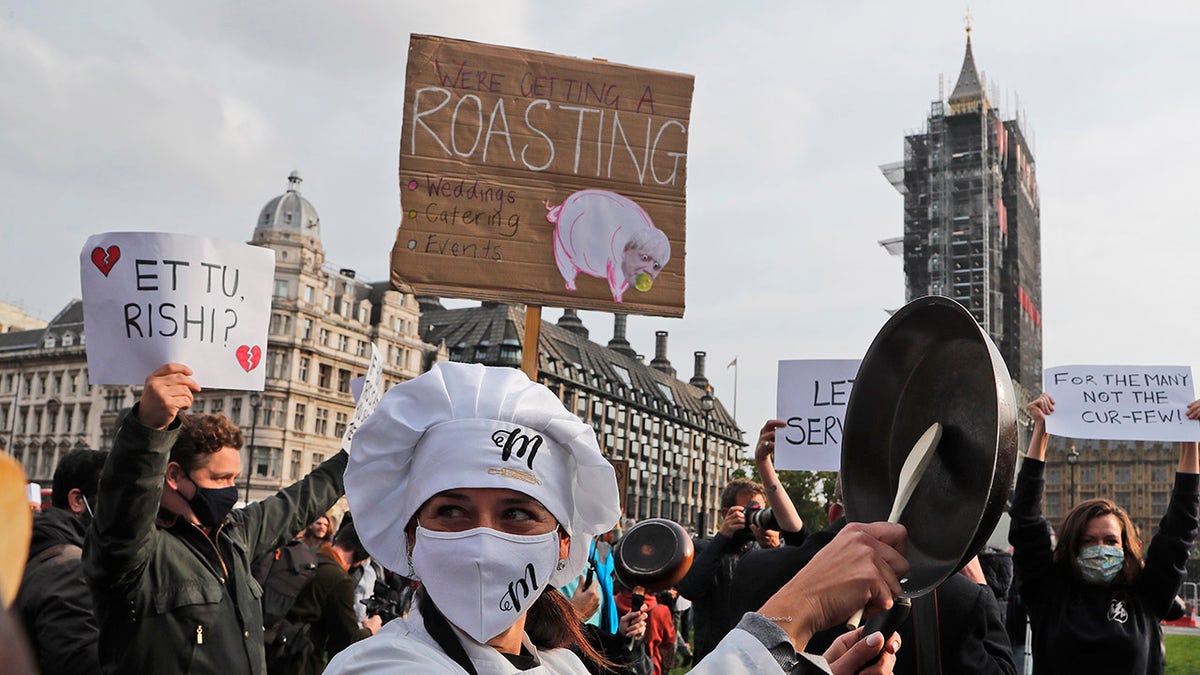Europe combats second wave of COVID-19
Fox News Medical Contributor Dr. Janette Nesheiwat tells ‘Fox & Friends’ what coronavirus challenges could lie ahead for the U.S.
Italy once again ramped up coronavirus restrictions in a bid to avoid a new nationwide lockdown, as parts of the United Kingdom have already reinstated lockdowns similar to those seen in March, and Poland converted a major stadium into a field hospital amid a massive surge in infections.
As more than 40 million infections have been recorded worldwide, reopened European countries brace for the second wave of COVID-19 cases. What once was the epicenter of the pandemic after the virus broke out from China is now considering hunkering down a second time.
Here’s a summary of the measures nations are taking to contain a second wave of the disease.
Italy
Italian Prime Minister Giuseppe Conte on Sunday announced a new raft of restrictions meant to curb a second wave of the coronavirus and prevent another nationwide lockdown.
Italy was the first nation ravaged by the virus earlier this year and had the second-highest death toll in Europe, behind just the United Kingdom. The new measures come after Italy recorded 11,705 new cases Sunday, up from 10,925 on Saturday and 10,010 Friday.
VIRUS AT 'TURNING POINT' IN EUROPE HITTING AT RISK GROUPS
Starting Monday, local mayors will have the authority to close public streets and other areas after 9 p.m. to limit public gatherings blamed for a recent spike in infections. Bars and restaurants with table service will be allowed to stay open until midnight, while those without table service must close by 6 p.m. Parties are limited to six people per table.
"We cannot waste time, we must put in place measures to avoid a generalized lockdown, which could severely compromise the economy,” Conte said in a televised address Sunday. "The government is here but everyone has to do their part."
The prime minister continued: “The most effective measures remain the basic precautions: mask, distance, and hand hygiene. We must pay attention to situations where we let our guard down - with relatives and friends. In these situations, the maximum precaution is required."
Other restrictions will apply to high school-age students, and start times will be staggered, and socially distanced learning measures will be applied, the BBC reported. Amateur contact sports are banned and local conferences and festivals will be canceled.
United Kingdom
Wales has become the second nation in the United Kingdom to lock down large swaths of its economy to combat rising coronavirus infections, even as British Prime Minister Boris Johnson is resisting loud calls to do the same throughout England.
Wales' First Minister Mark Drakeford said Monday that his administration was backing a short, sharp “firebreak” to slow the spread of COVID-19. All nonessential retail, leisure, hospitality and tourism businesses will close for two weeks beginning at 6 p.m. Friday — a lockdown similar in scope to the U.K.-wide measures imposed in March. Drakeford said the Welsh lockdown will definitely end Nov. 9.

Hospitality workers protest in Parliament Square in London, Monday, Oct. 19, 2020. Hospitality workers are demonstrating outside Parliament against tougher coronavirus restrictions and the amount of financial support given by the government to the industry. (AP Photo/Frank Augstein)
NEW UK BREXIT CAMPAIGN WARNS FIRM THAT 'TIME IS RUNNING OUT' TO PREPARE FOR NO DEAL
Northern Ireland has already ordered schools to close for the next two weeks, banned most social gatherings, and shut down many businesses including bars and restaurants for a month.
Authorities across the U.K. are imposing new restrictions on business and social interactions as COVID-19 infections rise throughout all age groups and parts of the country, filling hospital beds and intensive care wards. One of their main goals is to reduce the strain on the NHS ahead of the winter flu season.
Johnson has so far rejected advice from the government’s scientific advisers recommending another short nationwide lockdown and instead, arguing that his three-tier, regional approach to applying restrictions to areas with surging infection rates will limit the economic and social damage from the pandemic on areas where infection rates are lower.

Hospitality workers protest in Parliament Square in London, Monday, Oct. 19, 2020. Hospitality workers are demonstrating outside Parliament against tougher coronavirus restrictions and the amount of financial support given by the government to the industry.(AP Photo/Frank Augstein)
Greater Manchester has continued to reject efforts by Johnson's Conservative government to move the region into the highest level of restrictions in the three-tier system, as officials hold out for more financial assistance. Talks between Greater Manchester officials and Communities Secretary Robert Jenrick went on all weekend and Johnson has threatened to impose the measures unilaterally if an agreement can’t be reached by Monday.
Poland
Poland's government is transforming the National Stadium in Warsaw into a field hospital to handle the surging number of people infected with the coronavirus.

This Friday, May 18, 2012 file photo aerial view, made from an hot air balloon, shows the National Stadium, in Warsaw, Poland. Poland’s government is transforming the National Stadium in Warsaw into a field hospital to handle the surging number of patients infecting with the coronavirus. (AP Photo/Czarek Sokolowski, File)
Government spokesman Piotr Müller said Monday the stadium will have room for 500 patients and will be equipped with oxygen therapy for those who need it.
“We can see that the number of cases is growing so fast that we need to secure places for hospitalization for those who need it,” Müller said, speaking on TVP Info, the state TV’s all-news channel.
The stadium, with a seating capacity of over 58,500, was constructed to host matches for the Euro 2012 football championship, which Poland co-hosted with Ukraine.
Poland experienced very low rates of infection in the spring compared with western European countries but is now witnessing an exponential surge of coronavirus infections.
On Monday, the Health Ministry recorded 7,482 new coronavirus infections over the previous day and 41 deaths. Since the start of the pandemic, the nation of 38 million has recorded 183,248 cases and 3,614 deaths. However, the true rate of infection is likely higher.
In the past day, 36,000 COVID-19 tests were carried out, meaning that nearly 21% of all tests came back positive. Health Minister Adam Niedzielski warned Monday that Poland could have 15,000 to 20,000 new cases daily if infection rates keep increasing at their current pace. He said his ministry is preparing for that scenario.
France
As of Saturday, Paris and several other French cities, including Marseille, Lyon, Lille and Toulouse, were subject to restrictions including a 9 p.m. curfew. Restaurant and bar owners in Marseille said the city was unfairly targeted last month for the nation's toughest virus rules at the time.
President Emmanuel Macron said the new monthlong curfew applying to an estimated 20 million people was necessary to avoid overwhelming hospitals, but many employees, especially those in the restaurant sector are expected to lose their jobs, the BBC reported.
The French health ministry tallied a record 32,427 new cases Saturday, up from 25,086 the day earlier.
CLICK HERE TO GET THE FOX NEWS APP
The Associated Press contributed to this report.









































